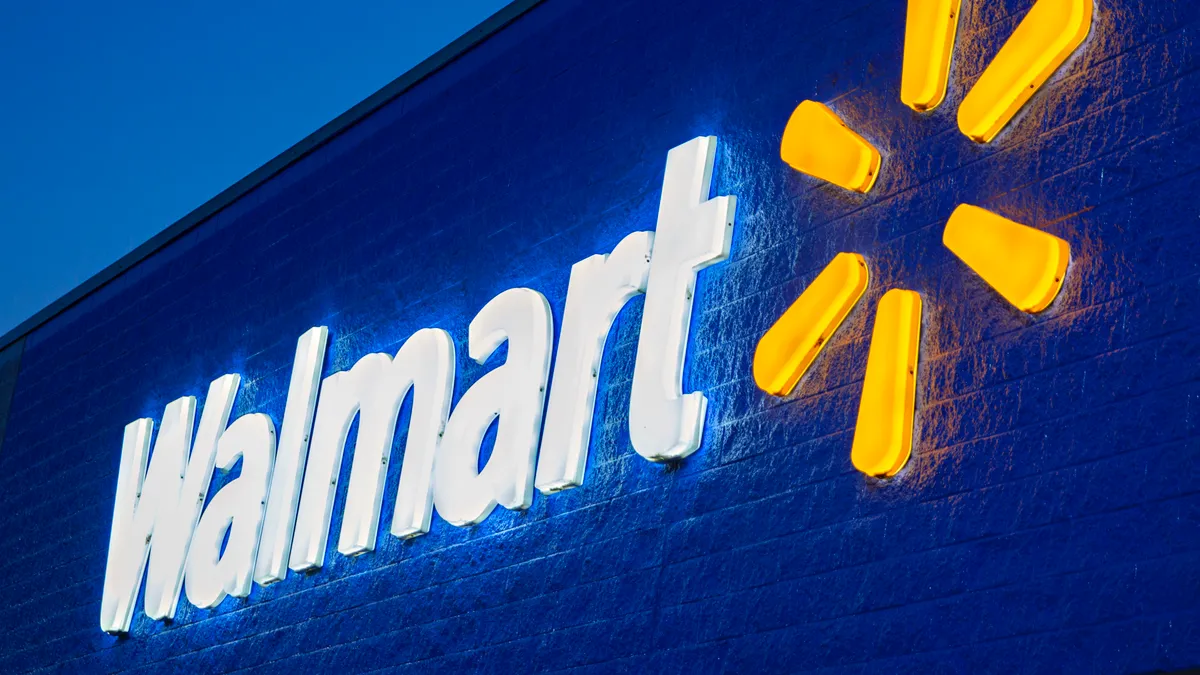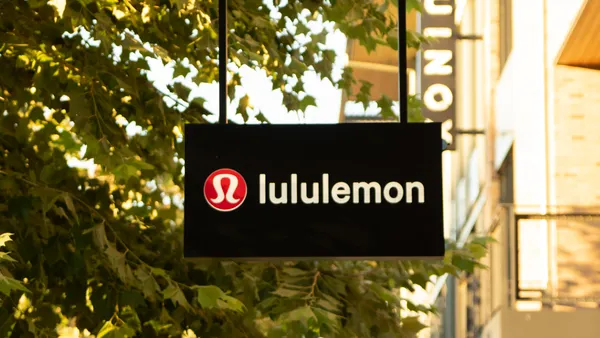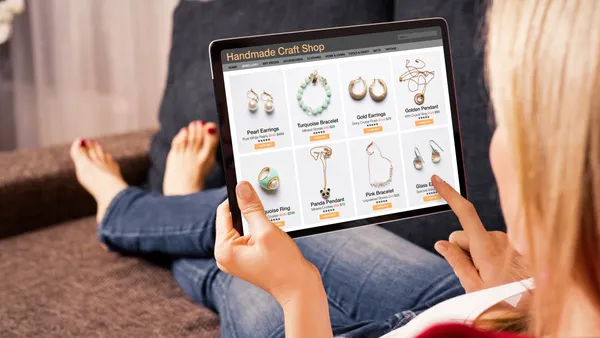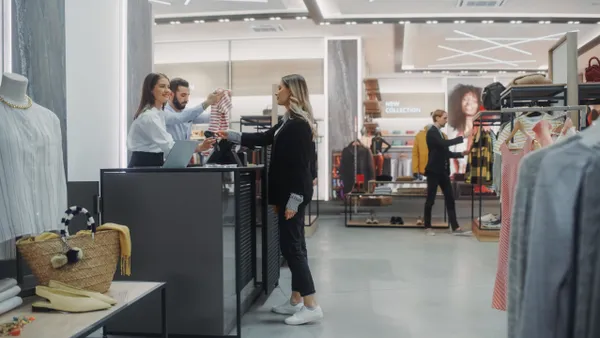It’s been another week with far more retail news than there is time in the day. Below, we break down some things you may have missed during the week, and what we’re still thinking about.
From Blake Shelton partnering with Lands’ End to questions about Amazon’s Prime strategy, here’s our closeout for the week.
What you may have missed
Lands’ End, Blake Shelton find harmony in partnership
Country music superstar Blake Shelton continues his partnership with Lands’ End with an expanded collection of clothes and accessories. The Blake Shelton X Lands’ End spring collection includes swimwear and garment-dyed knitwear, while the existing fall collection includes flannels, denim and “a classic six-string guitar plaid.”
“My new collection with Lands’ End is about clothes that feel like they were made just for you,” Shelton said in a statement. “It’s the feeling, the fit, and the confidence you feel whether it’s working, lounging, or just living life. After all, the only way to know if something’s right is to see for yourself because when you know, you know.”
David Witkewicz, senior vice president of design at Lands' End, said Shelton’s hands-on approach to the design process and appreciation of reliable, comfortable clothing will resonate with shoppers. Through Sept. 1, Lands’ End also will donate a portion of each purchase from the collection to Habitat from Humanity.
DTC intimates brand Parade heads to Target
Target has added products from DTC intimates brand Parade to its assortment.
The brand's products will be available in 400 Target stores, according to Business of Fashion. The partnership also marks Parade’s second major wholesale partnership. In July, the brand announced a partnership with Urban Outfitters to be sold in 25 of its stores and online.
Parade, which was founded in 2018, is also on track to hit $75 million in annual revenue, according to Business of Fashion.
DTC brands are increasingly looking to ink wholesale partnerships with major retailers as a way to broaden their customer base.
Charlotte Tilbury taps Bella Hadid as new face of the brand
Supermodel Bella Hadid is the new face and muse of luxury makeup brand Charlotte Tilbury. Past alumni include Kate Moss, Michaela Jaé Rodriguez, Twiggy and others.
“From beauty magic to beauty tech and so much more, Bella is just as obsessed as I am with breaking boundaries and transcending the real and virtual worlds — and I cannot wait to share with you all the extraordinary, magical moments we have in store,” beauty entrepreneur Charlotte Tilbury wrote on an Instagram reel with the announcement.
Featured on Charlotte Tilbury’s website are products worn by the model in two different looks done for the partnership. The sultry red lip look features most products from the beautiful skin collection. For the other look, the airbrushed flawless finish, most products from the airbrushed collection are used.
Retail Therapy
Peeps and Sally Hansen collaborate on Easter nails
As Easter quickly approaches, so do the dozens of Peeps marshmallow collaborations. First up, the candy brand announced a partnership with nail care company Sally Hansen that includes seven nail polish shades.
The shades – all with themed names – feature a new “sugar texture,” according to a company press release.
The finish apparently is similar to a Peeps marshmallow treat, but its likely not recommended to see if they taste the same as well.
Fashion, but make it unbreakable
Nalgene is known for creating water bottles that are nearly indestructible, but the company sees a lot of opportunity in turning its everyday accessory into a hot fashion item as well.
This week, Nalgene released its Monochrome Collection, which includes six single-color water bottles to take advantage of the “simple, yet striking trend of one-color dressing from head-to-toe.” The bottles come in both 16-ounce and 32-ounce styles depending on how thirsty customers want to look.
“We all know you look your best when you're fully hydrated,” Elissa McGee, general manager of Nalgene Outdoor, said in a statement. “That's why we created the perfect accessory to any look: the essential water bottle in a sleek, muted palette of colors to complement your outfit and your lifestyle.”
Monochrome dressers wishing to match their hydration vessel will have to adopt cotton white, jade green, butter yellow, denim blue, cherry blossom pink or mocha brown. Otherwise the product loses its elevated fashion superpowers and becomes, once again, just a water bottle.
What we’re still thinking about
73%
That’s how many people have developed a preference for private labels, according to consumer research platform Attest. Especially when it comes to consumer and grocery items, shopping off-label helped consumers find what they needed when shelves were bare during the pandemic. Now it's helping households stretch their budgets at a time of rising prices.
But private label is increasingly important for retailers selling apparel and other discretionary items as well. Kohl’s and Macy’s this week both touted initiatives revamping their private label assortments. Macy’s, who last year tapped veterans of Target’s wildly successful private label operation to spearhead the effort, saw Q4 sales of its I.N.C. brand rise 28% year over year following improvements.
“The role of private brands is to drive customer loyalty, be a differentiator for our business, complement our matrix of national brands and benefit our gross margin,” Macy’s CEO Jeff Gennette told analysts on Thursday.
$1B
That’s how much Walmart rakes in each month in orders fulfilled by its stores and delivered to customers – triple what it did two years ago, according to Walmart CFO John David Rainey.
Other retailers are expanding their store-based logistics to facilitate such sales. Recently, Target announced a $100 million investment in new sorting centers to advance its store-based hub strategy, and Best Buy said it would clear portions of its sales floor in some locations to help with online orders.
However, Nordstrom in November said it has scaled back store-based fulfillment at its off-price Rack stores.
What we’re watching
Will healthcare be part of Amazon’s Prime strategy?
Amazon’s nearly $4 billion acquisition of primary care company One Medical recently finalized, deepening the e-commerce giant’s connection to the healthcare industry.
With the acquisition comes a number of questions including if Amazon’s Prime subscription could be connected to One Medical memberships. If Amazon moved to bundle the memberships it could potentially create new revenue streams, including product advertising related to medical conditions.














